Delity Powell Kelly: A Child in a Confederate Camp
ECW welcomes guest author Sheritta Bitikofer
In January of 1930, a new soldier’s pension application was submitted in the state of Florida. While at first glance, this was nothing unusual for the time. Soldiers were growing older and desired compensation for their sacrifice to the Southern cause for independence. However, this application was special and marked up in unusual places. Instances where the word “he” were typed – referring to the applicant – had been crossed out and changed to “she.” The veteran, Delilah “Delity” Powell Kelly, born June 4th, 1851, was not looking for a widow’s pension. She was looking for a soldier’s pension for her services as a young nurse in the Confederacy.

When the Confederacy’s call for troops reached Apalachicola, Florida, Delity’s father, Edward Powell, answered that call. He enlisted in Milton’s Light Artillery under the command of Joseph L. Dunham [i]. He became one of the 136 privates to help man and operate six guns – three 12-pounder brass rifles and three 12-pounder howitzers[ii]. Delity’s mother, Nancy Elizabeth Powell, followed the artillery regiment as a laundress and nurse for the unit, taking their only daughter along with them. According to Delity’s own account, she was given a uniform trimmed in red to denote that she belonged to her father’s artillery regiment[iii].
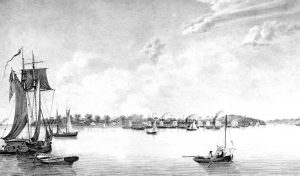
Imagine being a child at places like Camp Dunham near Jacksonville. You are miles away from your home and friends, among strangers and doing chores night and day to make sure everything within the camp ran smoothly. Instead of having tea parties with her friends, she gave water from her canteen to dying men. Instead of trotting off to the schoolhouse every morning, Delity followed the camp doctors as they made their morning rounds. We know that she was literate, and she might have practiced her reading skills by deciphering the labels on the medicine bottles. She would not be helping to make bread for her small family, but for an entire camp of hungry artillerymen. Dresses and petticoats in the laundry were replaced by filthy socks and fetid uniforms as she and her mother did the laundry for the unit. Instead of tying ribbons in her hair, she tied off bandages over bleeding or gangrenous wounds. Her formative childhood years were spent listening to the groans of the wounded, the boom of artillery cannon, and the muttered prayers lifted up by the weary souls that wanted this war to end.
Her father wasn’t the only man of Delity’s family to join the war. Five of her uncles also enlisted. Benjamin Powell, who was very close in age to Delity according to his records, enlisted with Milton’s Light Artillery as well, and later gave a notarized testimony to her services as a nurse and laundress for the company [iv][v][iii][xxiii]. John, James, and William Powell also enlisted with their older brother in March of 1861 into the same regiment [xxv][xxvi][xxvii]. Another uncle by the name of Elijah did not enlist in the artillery regiment, and instead joined the infantry in August of 1861, mustering in with the Fourth Florida Infantry [vi][xxiv]. Elijah went on to serve the Confederacy far away from his home and family.
Milton’s Light Artillery saw remained in the deep South during the war. Delity’s first taste of war came at St. Johns Bluff near Jacksonville in October of 1862[vii]. But this was not the last time she witnessed how devastating the war could be.
In the spring of 1863, the Milton Light Artillery was split into two companies. Company A remained under the command of Captain Dunham, while the newly promoted Captain Henry Abell was given Company B [viii]. The Powells followed Abell into this newly formed company, which made the muster rolls a little confusing. In many instances, men were listed under both companies. Delity’s own headstone indicated that she served within Company A, but under Abell’s command [ix].
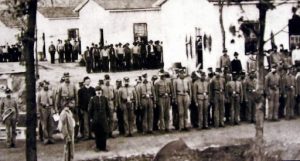
In the winter of that same year, bad news filtered its way to Camp Dunham near Gainesville. Edward’s brother, fighting in Tennessee, had been captured at Missionary Ridge during the battles around Chattanooga. Elijah Powell’s name would show on the first prisoner roster at the newly formed Rock Island Prison [vi]. Worse than that, Elijah had been wounded in the battle in which he was captured. He was shot in the right leg just below the knee, as well as at the corner of his eye. This eventually led to total blindness in that eye [xxiv]. The tragedy of war had finally made its way to Delity’s personal circle.
Their greatest test of valor and perseverance came in February of 1864 at the battle of Olustee, the largest battle of the Civil War to take place on Florida soil. Delity and her mother made themselves useful at Lake City Hospital, fifteen miles from the battlefield[iii].
The hardship of war would hit home one more time for Delity when Edward became wounded in the battle. Milton’s Artillery had lost five of its guns to a band of raiding Federals at Baldwin, so Company B under Captain Abell was attached to the First Georgia Regulars. A shell fragment struck Edward’s leg, and though the wound wasn’t serious enough to warrant an amputation, the injury would give him trouble in his later years. According to his pension application statement, the knee that was injured during the battle had caused some type of permanent swelling, making this knee noticeably larger than the other. This made it difficult to work in the labor industry after the war [xxii].
Jacksonville became occupied by the Union army in February of 1864 – prior to the battle at Olustee – and the artillery unit went on to serve in several smaller engagements, including the skirmish at Cedar Key in March of 1864, the battle at Horse Landing in May, and then the battle at Gainesville in August of that same year [x][xi][ii].
Elijah was not the only one to become imprisoned during the war. According to Delity in her pension application – backed by the testimony of Benjamin Powell – she and her mother were captured not once, but twice in the course of their service[iii]. One of these occurrences took place in Baldwin, Florida and for a month and fourteen days, Delity and her mother were kept prisoner by the Federals. It was likely that this didn’t give them a break from their usual duties, as nurses and laundresses were in high demand on both sides. Delity and her mother managed a daring escape from captivity by jumping out the window of their prison – presumably a local home or hospital – and made their way back to Camp Dunham to reunite with Edward.
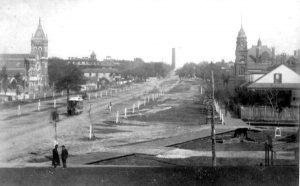
The Confederacy surrendered in April of 1865 and the South was thrown into the era of Reconstruction. Both companies of the Milton Light Artillery were included with the May 10th surrender between Major General Samuel Jones commanding the Department of South Carolina, Florida, and South Georgia, and Brigadier General Edward Moody McCook at Tallahassee, Florida, the same day that Jefferson Davis was captured in Irwinsville, Georgia. Veterans of the war came home to rebuild their lives – including Elijah who had survived Rock Island for two years. Delity, now almost 14 years old, moved to Pensacola, Florida with her family[xii]. Edward and Nancy had three more children and Edward supported his family as a fisherman, which was familiar work for him, since he worked as a sailor with his father in Apalachicola. Delity grew up, occasionally putting her nursing skills to good use as she helped to take care of her younger siblings. Those who knew Delity in her final years described her as a deeply religious woman. This could have been due to her experiences in the war or by her father’s elevation to the position of an elder in the Church of Latter Day Saints within a decade after the war [xix][xx][xxi]. Edward officiated the marriage between his nephew Benjamin and fiancé, Savine Milstead in 1878 [xxiii].
In January of 1871, Delity married James Kelly, an illiterate carpenter from Santa Rosa County[xiii]. They had four children and by the 1930s, they had all started families of their own, leaving Delity and James with an empty nest [xiv]. By then, both were too old to work. Whether under the encouragement of her family or her own gumption, Delity decided to do something that no other woman had succeeded in doing in the state of Florida.
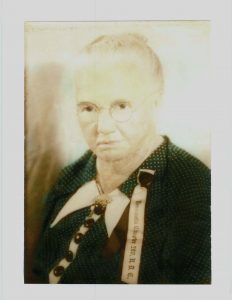
In January of 1930, she first submitted her application for a soldier’s pension[iii]. It seemed like a simple process. She was to give her testimony of service, backed by two or more others who could confirm her story, then sign her name at the bottom of the page.
Three other veterans who worked closely with Milton’s Light Artillery gave their signed testimonies to Delity’s services, saying that they indeed saw her in the red-trimmed artillery uniform and watched her give aid to the wounded. One of these witnesses was her uncle, Benjamin Powell. The other was a former cavalry private by the name of Joseph Strickland, who was living with his son’s family at the time when he testified to Delity’s service [xv]. Private Strickland had been with the Fifteenth Confederate Cavalry post-September 1863 and operated in Alabama for most of that time, but prior to that he had enlisted with the Third Florida Battalion, also known as the “Magnolia Dragoons”, who worked closely with other Florida units like Milton’s Light Artillery [xvi][xvii][xviii]. Strickland also vouched for Benjamin’s service when he applied for a pension some years earlier, mentioning Elijah in the same affidavit [xxiii]. In fact, looking into all of the pension records for Delity’s uncles reveals that they all vouched for one another’s service when they individually applied, or when their widows applied for compensation.
Delity Powell Kelly was awarded her pension rights, becoming the only woman in the state of Florida to receive a soldier’s pension for services rendered during the Civil War. Every year until her death, she was given $480. According to the records and pension approval, she was to be issued her pension “at the same rate and in the same manner that other pensioners are paid.”
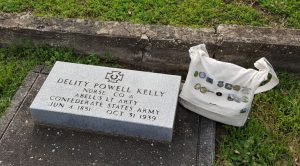
October 31st, 1939, at the age of 88, Delity passed away. Initially buried in an unmarked grave, it took almost fifty years before her story would be uncovered by her descendants. She was reinterred in the 1980s in Saint Michael’s Cemetery in Pensacola, Florida, and given a proper grave marker that forever proclaims her services to the Confederate cause as a nurse[ix].
All too often, we take for granted that the Civil War didn’t solely affect the adults who enlisted or volunteered their services. The lives of every American were touched by the conflict. Children, young and impressionable, became casualties of the war, either in a physical or psychological sense. Delity’s story reminds us that the war was no respecter of age or gender. At the tender age of ten years old, she had to shoulder a weight that not many grownups could handle today. It’s by this resilience and bravery that she deserves to be remembered and honored for sacrificing her childhood.
Sheritta Bitikofer is a lifelong student of history with a specific interest in the Civil War era. Along with being a wife, historical fiction author, and fur-mama of two, she is an active member of the Mobile and Pensacola Civil War roundtables, and is currently pursuing a BA in US History at American Public University. She also manages her own Civil War blog where she writes about her studies and many travels to battlefields and other historic sites.
Citations:
[i] Compiled service record, Edward Powell, Private, Company A, Capt. Dunham’s Milton Light Artillery Company; Carded Records Showing Military Service of Soldiers Who Fought in Confederate Organizations , compiled 1903 – 1927, documenting the period 1861 – 1865, record group 360; National Archives, Washington, D.C.
[ii] “Florida Milton Light Artillery History.” http://www.researchonline.net/flcw/unit27.htm (accessed August 17th, 2019)
[iii] “Confederate Pension Application, KELLY, Delity Powell, Application #A10220” Florida Memory, State Library and Archives of Florida. https://www.floridamemory.com/items/show/173331 (accessed August 17th, 2019) Pages 1-16.
[iv] Edward, Benjamin, and Elijah Powell, 1850 U.S. census, Franklin County, FL, population schedule, Apalachicola, p. 244A (handwritten, (679) stamped), dwelling 421, family 422; NARA microfilm publication M432, roll 59.
[v] Compiled service record, Benjamin Powell, Private, Company A, Capt. Dunham’s Milton Light Artillery Company; Carded Records Showing Military Service of Soldiers Who Fought in Confederate Organizations , compiled 1903 – 1927, documenting the period 1861 – 1865, record group 360; National Archives, Washington, D.C.
[vi] Compiled service record, Elijah Powell, Private, Company B, Fourth Florida Infantry; Carded Records Showing Military Service of Soldiers Who Fought in Confederate Organizations , compiled 1903 – 1927, documenting the period 1861 – 1865, record group 360; National Archives, Washington, D.C.
[vii] Compiled Unit Information, Capt. Dunham’s Milton Light Artillery Company; Carded Records Showing Military Service of Soldiers Who Fought in Confederate Organizations , compiled 1903 – 1927, documenting the period 1861 – 1865, record group 109; National Archives, Washington, D.C.
[viii] “Abell’s Artillery Company B, Milton Light Artillery.” Battle of Olustee. http://battleofolustee.org/abell.html (accessed August 17th, 2019)
[ix] Find A Grave, database and images (https://www.findagrave.com : accessed 23 August 2019), memorial page for Delity Powell Kelly (4 Jun 1851–31 Oct 1939), Find A Grave Memorial no. 10425149, citing Saint Michael’s Cemetery, Pensacola, Escambia County, Florida, USA; read and photographed by Sheritta Bitikofer, March 12th, 2019.
[x] Taylor, Paul. Discovering the Civil War in Florida: a Reader and Guide. Sarasota, FL: Pineapple Press, Inc., 2012.
[xi] Nulty, William H. Confederate Florida The Road to Olustee. Tuscaloosa: University of Alabama Press, 2014.
[xii] 1870 U.S. census, Escambia County, FL, population schedule, Pensacola, p. 628A (handwritten, 73 stamped), dwelling 566, family 525, Delity Powell, NARA microfilm publication M593, roll 129.
[xiii] 1880 U.S. census, Santa Rosa County, FL, population schedule, enumeration district (ED) 136, p. 179B (stamped), p. 46 (penned), dwelling 428, family 428, Delilah Kelly; NARA microfilm publication T9, roll 132.
[xiv] 1930 U.S. census, Escambia County, FL, population schedule, enumeration district (ED) 0015, p. 2B (stamped), p. 4 (penned), dwelling 50, family 54, Delilah Kelly; NARA microfilm publication T626, roll 315.
[xv] 1930 U.S. census, Escambia County, FL, population schedule, enumeration district (ED) 0022, p. 16A (stamped), p. 3280 (penned), dwelling 348, family 387, Joseph S. Strickland; NARA microfilm publication T626, roll 31.
[xvi] Compiled service record, J.S Strickland, Private, Company A, Fifteenth Confederate Cavalry; Carded Records Showing Military Service of Soldiers Who Fought in Confederate Organizations , compiled 1903 – 1927, documenting the period 1861 – 1865, record group 109; National Archives, Washington, D.C.
[xvii] Compiled service record, J.S Strickland, Private, Company A, Third Florida Battalion Cavalry; Carded Records Showing Military Service of Soldiers Who Fought in Confederate Organizations , compiled 1903 – 1927, documenting the period 1861 – 1865, record group 360; National Archives, Washington, D.C.
[xviii] Compiled Unit Information, Fifteenth Confederate Cavalry (1st Regiment, Alabama and Florida Cavalry); Carded Records Showing Military Service of Soldiers Who Fought in Confederate Organizations , compiled 1903 – 1927, documenting the period 1861 – 1865, record group 360; National Archives, Washington, D.C.
[xix]Hoar, Jay. “Nudged by Nostalgia – Youngest Blue and Gray.” Lewiston Sun Journal, July 29, 2019. https://www.sunjournal.com/2019/07/31/nudged-by-nostalgia-youngest-blue-and-gray/
[xx] 1910 U.S. census, Santa Rosa, FL, population schedule, enumeration district (ED) 102, p. 8B (stamped), p. 8757 (penned), dwelling 163, family 166, Edward Powell; NARA microfilm publication T625, roll 167.
[xxi]Ancestry.com. Early Members of the Reorganized Church of Jesus Christ of Latter Day Saints [database on-line]. Provo, UT, USA: Ancestry.com Operations, Inc., 2013. (accessed August 23rd, 2019).
Original data: Black, Harvey B. Early Members of the Reorganized Church of Jesus Christ of Latter Day Saints. 6 vols. Provo, UT: Infobases, 1996. Private donor to ancestry.com.
[xxii] Confederate Pension Application, POWELL, Edward, Application #A01648” Florida Memory, State Library and Archives of Florida. https://www.floridamemory.com/items/show/174652?id=1 (accessed September 4th, 2019) Pages 1-20.
[xxiii] Confederate Pension Application, POWELL, Benjamin F., Application #A10283” Florida Memory, State Library and Archives of Florida. https://www.floridamemory.com/items/show/173394?id=1 (accessed September 4th, 2019) Pages 1-20.
[xxiv] Confederate Pension Application, POWELL, Elijah, Application #A06283” Florida Memory, State Library and Archives of Florida. https://www.floridamemory.com/items/show/170048?id=1 (accessed September 4th, 2019) Pages 1-12.
[xxv] Confederate Pension Application, POWELL, John, Application # A11406” Florida Memory, State Library and Archives of Florida. https://www.floridamemory.com/items/show/175610?id=12 (accessed September 19th, 2019) Pages 12-15.
[xxvi] Confederate Pension Application, POWELL, James, Application # A02360” Florida Memory, State Library and Archives of Florida https://www.floridamemory.com/items/show/177371?id=10 (accessed September 19th, 2019) Pages 10-24.
[xxvii] Compiled service record, William Powell, Private, Company A, Capt. Dunham’s Milton Light Artillery Company; Carded Records Showing Military Service of Soldiers Who Fought in Confederate Organizations , compiled 1903 – 1927, documenting the period 1861 – 1865, record group 360; National Archives, Washington, D.C.
What a geat personal story and piece of history – thank you for sharing it!
Great account presented here. Thank you for that..
Excellent article and Wonderful reminder of a neglected constituent of the Civil War (Florida); and compelling account of Delity Kelly, one of the many colorful characters who called Florida home (the list includes Patton Anderson, Lewis Powell, Stephen Mallory, William H. Chase, David Levy Yulee, Don Francisco Moreno…)
Fascinating article! It is these stories “off the beaten path” that peak my interest the most. Thanks!
I live in Tampa and hope to visit her grave.